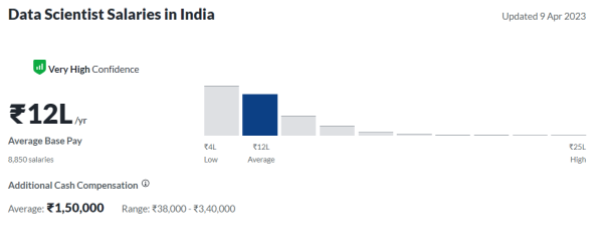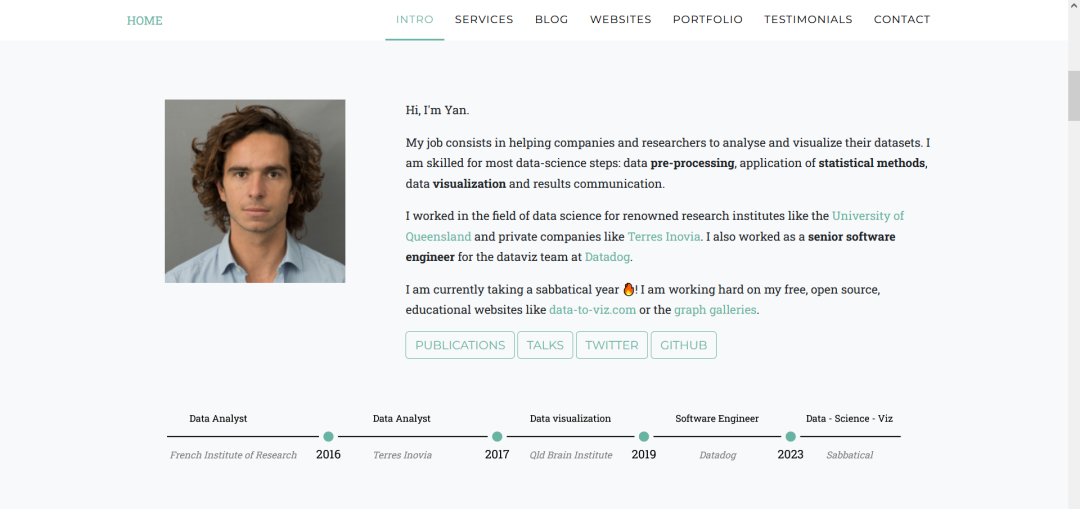Team Apr 26, 2023 No Comments
In the world of data science, things change and evolve very quickly. If you do not remain updated with the latest happenings and trends in data science, you will definitely fall behind. With new developments emerging constantly, it can be challenging to keep up with the latest advancements. There are several strategies that data scientists can use to stay informed about the data science trends in 2023.
Books have always been the traditional source of gaining knowledge, and they remain relevant even now. Books are a great way to learn a new subject, even if they may not always be the easiest or fastest to read. Some of the most experienced data scientists and researchers have written books on data science that will remain relevant and important forever. They are a great way to remain updated about the latest trends in data science.
Authors of textbooks are usually experienced in their fields and provide the information needed in a chronological fashion. Though information is easily available these days, it is important to consume information chronologically to make more sense of it.
Textbooks generally provide a more detailed and comprehensive exploration of a subject than blogs or articles, or a whitepaper. Using textbooks to gain knowledge on various topics in data science becomes particularly important when you are trying to build a strong foundation for a specific subject.
Some top books you can go for inlcude:
Online courses and certifications provide a convenient way to learn new skills and technologies in data science. Such courses cover a wide range of topics, including machine learning, data visualization, and deep learning, and are taught by industry experts and academics. Numerous online courses and certifications such as Udacity, Coursera, Udemy, edX cover a wide range of topics, from the basics of data science to advanced machine learning techniques which are building the future of data science.
If you want to upgrade your data science skills, Ivy Professional School’s data science courses are the best option. Through these courses, students receive top-notch training from experienced faculty from esteemed institutions such as IITs, IIMs, and US universities and have the opportunity to work on real-world analytics problems through capstone projects and internships.
The courses offer the flexibility of attending in-person or online live classes. Ivy provides lifetime placement assistance to its students, ensuring they have access to the right resources to achieve their career goals.
Some of the most popular data science courses from Ivy Professional School include:
Once you are working in the data science domain, following thought leaders and experts in the data science community on social media platforms such as LinkedIn, Twitter, and Medium is a great way to stay informed about the latest trends in data science and AI. Experts often share valuable insights, knowledge, updates and data science news. Social media gives the option of interacting with them by commenting on their posts as well.
Some of the leaders you can follow include Geoffrey Hinton, Yann LeCun, Andrew Ng, Fei-Fei Li, Ian GoodFello, Andriy Burkov, Demis Hassabis, Cassie Kozyrkov, Andrej Karpathy, Alex Smola, among others.
If you prefer audio-visual learning, YouTube is a great option to stay updated with the latest technologies and get data science news. For data science courses, statistical and mathematical concepts, and detailed tutorials on programming, YouTube has free lectures from leading institutes such as MIT, Stanford, Harvard, Oxford, and Princeton, which is a great way to gain knowledge in a subject in a cost-efficient and time-saving manner.
If you are a beginner or even an experienced professional who wants to learn new concepts, Ivy Professional School’s YouTube channel can greatly help you. It covers detailed videos on various topics in Python, SQL, PowerBi, Tableau, Advanced Excel, and new technologies.
Some of our popular playlists include:
Check out Ivy’s videos here.
Attending industry events is a great way to stay informed latest data science trends. By attending sessions and workshops, you can learn about the latest tools, techniques, and frameworks being used in the industry and interact with other professionals in the field. You can also network with others, leading to new job opportunities.
Joining online communities such as Kaggle, Data Science Central can help you connect with other data scientists, participate in discussions, and learn from others’ experiences. In these forums, you can ask questions, share your knowledge, and collaborate on projects.
Experimenting with new tools, technologies, and frameworks can help you stay ahead of the curve, learn through practical experience, and remain updated with the latest trends in data science. By experimenting with latest technologies in data science, you can also discover new approaches and projects to solve problems and gain insights that can be applied in your work.
Staying up-to-date with the latest happenings and data science trends in 2023 is essential for professionals to remain competitive and relevant. By remaining informed, you can make better decisions, provide more effective solutions, and make a great future in data science.
Team Apr 20, 2023 No Comments
Data science has emerged as one of the most promising career paths in recent years. And why not. A data science career allows you to work with cutting-edge technologies, get lucrative remuneration and directly impact a business through data driven decisions.
In fact a report states that the global data science platform market was valued at USD 95.31 billion in 2021 and is expected to grow at a CAGR of 27.6% during the forecast period. As the demand for data driven business decisioning will increase, the companies will require more and more people with capabilities to derive meaningful insights from data. This will increase the availability of jobs in data science.

Source: Polaris Market Research
There is an exponential growth of data generated by businesses, organizations, and individuals, creating a huge demand for data scientists and analysts. Data scientists come with the capabilities to analyze and interpret complex data sets, figure out patterns and insights, and use this information to make informed business decisions.
They are crucial in the organization, and their output directly impacts business decisions. The demand for jobs in data science is expected to continue to grow in the coming years. A data science career path is quite sought after for people with strong mathematics, statistics, and computer science background.
Data science career is considered one of the most lucrative career paths in the current job market. The demand for skilled data scientists is at an all-time high, and the salaries and benefits offered to data scientists clearly showcase the demand. The data scientist career path depends on several factors, such as years of experience, location, and industry.

Image Source: Glassdoor
As data scientists can work in a variety of industries, it gives them a wide range of job opportunities and the ability to explore different industries and career paths. As the demand for data-driven decision-making continues to grow, we can expect to see the demand for skilled data scientists soar.
A data scientist’s work has a significant impact on businesses, organizations, and society. A data scientist works on complex data sets and identify patterns and insights that help businesses make informed decisions. A data scientist working in healthcare analyzes patient data to figure out patterns that can eventually lead to more effective treatments and better outcomes.
A data scientist working in finance handles and analyzes customer data that can help to prevent frauds or improve the customer experience. A data science acreer offers opportunities to work on meaningful projects that have a real impact on the world.
Data scientists work on cutting-edge technologies as they need to analyze and interpret complex data sets. Data scientists are often at the forefront of technological advancements, developing and implementing innovative solutions to solve complex business problems.
Data scientists use many tools and technologies, including programming languages like Python, R, and SQL and machine learning frameworks like TensorFlow and PyTorch. They also use various data visualization tools like Tableau and Power BI to present their findings in an easy-to-understand format. As the sector advances, data scientists will play a crucial role in developing and implementing innovative solutions to solve complex problems.
If all of these sound exciting, a great way to start a data science career will be by joining a course that understands your needs.
Ivy Professional School is a great choice that provides students with the necessary skills and guidance to launch a successful career in analytics. Ivy starts from the basics and gradually moves to advanced concepts in analytics so that even beginners can easily grasp concepts.
Students are trained by faculty from elite institutions like IITs, IIMs, and US universities and exposed to real-world analytics problems through capstone projects, case studies, and internships. At Ivy Professional School, students receive support from teaching assistants to address their questions and concerns. Ivy offers sessions on building effective resumes and conducting mock interviews to prepare students for job opportunities. These resources help ensure that Ivy students are fully prepared and job-ready for future opportunities in data science.
Watch this video to get more tips on how to build a Career in Data Science
Team Apr 11, 2023 No Comments

Updated in May 2024
You have worked hard on your data science skills. You have analyzed datasets, built models, and maybe even told stories through data visualization. That’s great.
But when it’s time to find job opportunities, you have to show clients and hiring managers what you can really do. And they can’t read your mind and may not believe what you say.
That’s where you need a data science portfolio.
This portfolio is proof of your expertise. It showcases projects that convince potential employers that you are the ideal candidate for the job.
In this blog post, we will share some tips for building a data science portfolio that will make you stand out from the crowd and land your dream job.
A data science portfolio lists your projects and code samples to demonstrate your skills in action. Here, you provide your professional details to help potential employers decide whether you are the right candidate.
Building a portfolio is crucial for a data science career. Often this portfolio is what determines whether you get a job opportunity. It lets potential employers see your thought process, problem-solving skills, and what you can bring to the table.
You can build your portfolio either on your website or third-party platforms like Kaggle and GitHub. Your portfolio could include things like:
A portfolio shows your commitment to ongoing learning and development. Whether you are a beginner or a professional data scientist, a strong portfolio can make a world of difference in your career.

The data science job market is competitive. A thoughtful portfolio gives you a competitive advantage and helps you win job opportunities.
How does that happen? Well, the portfolio gives employers tangible evidence of your skills. You are not only saying you know data analysis but demonstrating it with completed projects. You know how the old proverb goes, actions speak louder than words.
Portfolio also lets you show your thought processes, creativity, and how you tackle real-world data problems. This adds a personal touch and helps you stand out from other candidates.
Even if you are a beginner who lacks work experience, a data scientist portfolio is all you need. It shows you are a skilled and passionate data scientist who is serious about his/her work. And this increases your chances of getting hired.
Here are some helpful tips that will help you build a thoughtful data science portfolio and get high-paying jobs in top MNCs.
Data science is a vast subject. It covers numerous sub-topics like machine learning, natural language processing, computer vision, data visualization, etc. While it’s great to be an all-rounder, trying to showcase everything in your portfolio can dilute the impact.
Instead, identify the areas of data science you hold expertise and are passionate about the most. Here are some specific areas you can focus on:
By choosing a niche, you play to your strengths and interests. You can go deeper into specific projects and showcase your expertise. This is more impressive than trying to be a jack-of-all-trades.
This also helps you find the right opportunities. If a potential employer is looking for someone specialized in natural language processing, and your portfolio highlights several NLP projects, you are a clear match.
Now, this doesn’t mean you have to stick to the same niche and can’t explore other areas later. As you gain experience, you can try other niches and change your portfolio. But when you are a beginner data scientist, focusing on a specific area helps a lot.
The About section tells who you are as a data scientist and frames how someone sees your work. Here, you can provide a brief and professional introduction to you, your skills, and passion for data science.
You can include the following details in the About section:
You can show a little personality in this section to make your portfolio different and more memorable. It will grab employer’s attention and make them consider your portfolio.
Pro tip: If you know the exact company you are targeting, adjust your data science portfolio to match the company’s requirements.

Time to show what you can do as a data scientist. Now, this doesn’t mean that you have to show every project you have ever done.
Just the best 2-4 projects in your selected niche that highlight your skills will do the job. The projects should be unique, creative, and challenging to impress the employers.
For each featured project, follow this structure:
Your data science portfolio should also show the code you used in the projects. You can do it with Jupyter Notebooks or GitHub repositories. This will help to showcase your ability to write clean, organized, and well-documented code.
For example, Vaishnav Bose, a student at Ivy Pro School, has shown different projects he has undertaken on GitHub.

You need the right people to find you and see your portfolio. An active online presence can help you do that. It can increase visibility to potential employers and attract the right opportunities.
You just have to talk about your projects and showcase your skills on online platforms. Here are some platforms you can try:
For example, Aritra Adhikari, an Ivy student, has written this medium post highlighting how he predicted customer lifetime value for an auto insurance company.

An online presence shows you are serious about your work. So, try to be consistent and keep sharing what you learn. You will see significant benefits within a year.
Pro tip: Link your data science portfolio to the bio of your profile on every platform. This will make it easy for people to discover your portfolio.
Building a data science portfolio is not a one-time thing. It’s a process. A never-ending process.
That means your portfolio should keep evolving as you advance in your career. You should keep adding new projects, update the old ones, and change the descriptions to reflect your current thought process.
As you gain experience, gather knowledge, master tools, and learn new skills, your portfolio should reflect that. It will show potential employers that you’re not stagnant but committed to your growth.
Also, get feedback from your peers and mentors to identify how your portfolio could be improved.
Your portfolio is a reflection of your expertise. It should show your journey of becoming a better data scientist.
A portfolio is a crucial element that can boost your career. That’s why Ivy Pro School helps students build an impressive portfolio in the Data Science and AI course.
This comprehensive course teaches you everything about data science, from data analytics, data visualization, and machine learning to Gen AI.
You get coached by IIT professors and industry experts working in Amazon, Google, Microsoft, etc. So, you can imagine how high the quality of teaching will be.
The course helps you complete 50+ real-world projects, including live industry capstone projects. This way, you not only gain hands-on experience but also build a solid data science portfolio that showcases your skills to potential employers.
Visit this page to learn more about Ivy’s Data Science and AI course.
Team Apr 08, 2023 No Comments
Analytics is an exciting career due to the high demand for professionals who can analyze data and provide insights,, the chance to work with cutting-edge tools and technologies, and the satisfaction of making a significant impact on businesses and organizations. Starting a career in
Team Apr 04, 2023 No Comments
A data engineer’s role involves designing, developing, and maintaining the systems and infrastructure necessary for processing, storing, and analyzing massive datasets. They oversee the creation and management of data pipelines, maintaining databases, ensuring the quality of data, and integrating diverse data sources. Data engineers are the backbone of data-driven organizations working on efficiently and effectively using data in decision-making processes.
With the ever-increasing amount of data being generated and collected by businesses, we are witnessing a growing demand for skilled data engineers. To tap into this industry and make a rewarding career in data engineering, here are some top courses that can kickstart your career as a data engineer.
Ivy equips students with all the skills to launch a successful data engineering career. Ivy Professional School’s Cloud Data Engineering certification course provides hands-on experience with real-life projects and case studies in Big Data Analytics and Data Engineering. The students are assisted by teaching assistants to clear their questions and doubts. Students have the option to attend live face-to-face or online classes. Ivy also provides lifetime placement support to its students. Ideally, the course takes 6 months to complete.
The course covers important topics such as:
The course will allow students to join the fast-growing and rewarding data industry. A student can learn from anywhere, as the option of joining live classes online is also available. The course also focuses on holistic development, providing students with essential job-oriented skills such as CV building, LinkedIn profile building, networking skills, and interview skills, among others.
This course provides information on various aspects of data engineering, including the principles, methodologies, techniques, and technologies involved. Students will learn how to design and build databases, manage their security, and work with various databases such as MySQL, PostgreSQL, and IBM Db2. Students will be exposed to NoSQL and big data concepts including practice with MongoDB, Cassandra, IBM Cloudant, Apache Hadoop, Apache Spark, SparkSQL, SparkML, Spark Streaming.
In this course, students will get all the necessary skills to build their data engineering career. Students will acquire knowledge related to various concepts such as creating data models, constructing data warehouses and data lakes, streamlining data pipelines through automation, and handling extensive datasets.
They will learn how to design user-friendly relational and NoSQL data models that can handle large volumes of data. Students will also acquire the skills to construct efficient and scalable data warehouses that can store and process data effectively. They will be taught to work with massive datasets and interact with cloud-based data lakes. Students will learn how to automate and monitor data pipelines, which involves using tools such as Spark, Airflow, and AWS.
Coursera offers a variety of courses in data engineering. The courses discuss all the skills needed to excel in a data engineer role. They discuss the various stages and concepts in the data engineering lifecycle. The courses teach various engineering technologies such as Relational Databases, NoSQL Data Stores, and Big Data Engines.
Just like Coursera, Udemy offers a plethora of courses in data engineering. Some popular ones include Data Engineering using AWS Data Analytics, Data Engineering using Databricks on AWS and Azure, Data Warehouse Fundamentals for Beginners, Taming Big Data with Apache Spark and Python – Hands On, among others.
Online data engineering courses provide an excellent opportunity to acquire new skills and knowledge Whether you are a beginner or an experienced professional, these courses can help you gain a deeper understanding of data engineering concepts, stay up-to-date with the latest trends and technologies, and accelerate your career.